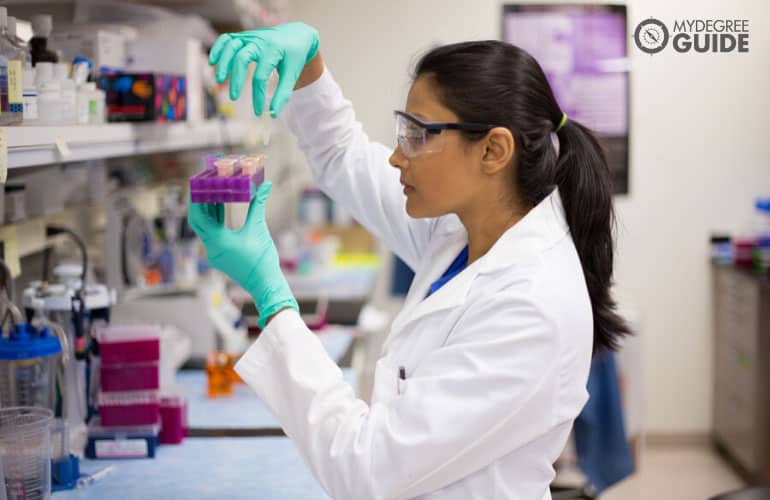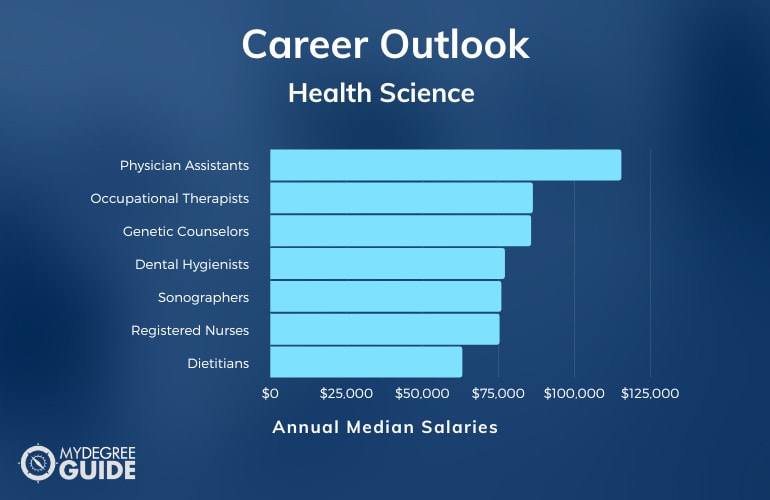An accelerated health science degree program can help you enter this rewarding career field in as little as two years. This specialized but broad field is defined by the Bureau of Labor Statistics as any career that involves helping people and animals by providing the medical care they need to get or stay healthy.

Healthcare, in general, is a large and booming field. There are over 12.2 million jobs that are classified as health science careers. Your salary potential could be just as diverse, from $27,080 on the lower end to $208,000 on the high end.
Editorial Listing ShortCode:
You could choose to specialize in over 50 different fields in health science, such as physiological science, clinical engineering, medical physics, or life science. You could pursue a career in hands-on healthcare, marketing, management, administration, research, or education.
Types of Accelerated Health Science Degree Programs
Most health science degree programs will allow you to choose from 3 main tracks: pre-professional, clinical management, or public health and education. The pre-professional track can help set you up to pursue further education and a career in clinical practice.
There is a variety of specializations that can be pursued when earning a Bachelor of Science in Health Science. Options include:
- Public Health
- Pharmaceutical Science
- Clinical Science
- Health Service Management
- Gerontology
- Global Health
- Rehabilitation Studies
- Athletic Training
- Exercise Science
- Kinesiology
- Health and Physical Education
- Fitness Management
You can also take a General Study track, which can help you transition into pre-med school, nursing school, or pharmaceutical studies.
Accelerated Health Science Degree Programs Overview

Your health science degree program will offer a variety of classes that will match up with the area that you choose to focus on. A bachelor’s degree program is often more general instead of focusing on a specific topic, but many of your classes will be related to the specialization you choose.
Here is a sampling of some of the classes you might take:
- Health Care Economics
- Health Promotion
- Musculoskeletal Basis of Exercise
- Prevention and Care of Sports Injuries
- Professional Dynamics and Allied Health Professions
- Interdisciplinary Approaches to Care
- Transcultural Health Care
- Health Care Leadership
- Statistics for Health Care Professionals
Health science degrees are typically geared toward one of three different tracks: Health Administration, Public and Community Health, or Fitness Management.
Careers with an Accelerated Health Science Degree

Getting a degree in health science can help you enter the world of health care, which continues to be one of the most in-demand fields of occupation.
According to the Bureau of Labor Statistics, the health science careers with the highest rate of growth and potential are in the therapeutic services industries, though these jobs do require further education. With this career, you could end up working in a laboratory, doing research, or providing indirect patient care.
You might also pursue work as a clinical administrator or in management in a hospital, school, clinic, or government agency.
With further education, you may start a career as a nurse, physician assistant, physiotherapist, pharmacist, health educator, or social worker. The career options with a health science degree are quite numerous!
According to the Bureau of Labor Statistics, some careers in the health science field are:
| Career | Annual Median Salary |
| Physician Assistants | $115,390 |
| Occupational Therapists | $86,280 |
| Genetic Counselors | $85,700 |
| Dental Hygienists | $77,090 |
| Sonographers | $75,920 |
| Registered Nurses | $75,330 |
| Dietitians | $63,090 |
| Exercise Physiologists | $50,280 |
| Athletic Trainers | $49,860 |
| Recreational Therapists | $47,710 |
For some of these jobs, companies and employers may require advanced degrees in addition to a bachelor’s in health science to apply.
Why Enroll in an Online Accelerated Health Science Degree Program

The fastest online degree programs typically offer a lot of flexibility and convenience. Here are some of the main benefits of earning your degree through an online accelerated health science degree program.
Don’t Have to Wait to Start!
Most online universities offer start dates each month, which means you may start your degree whenever it works best for you. Taking advantage of these flexible start dates can help put you months ahead of traditional school schedules.
Won’t Waste Time!
A traditional class takes 16 weeks to complete. Many online programs offer the option to take accelerated classes, which typically take half as long to finish.
Can Do It on Your Own Time!
With online classes, you don’t have to drive to campus, and for many of them, you don’t have to attend class at a certain time. You may complete your coursework wherever and whenever it’s convenient for you.
Accreditation for an Online Health Science Degree

Whether you take classes on campus or online, you should be able to receive a quality education. To ensure that your university is up to the highest standards, you can look for it to have regional accreditation from one of these boards:
- Higher Learning Commission (HLC)
- Middle States Commission on Higher Education (MSCHE)
- New England Commission of Higher Education (NECHE)
- Northwest Commission on Colleges and Universities (NWCCU)
- Southern Association of Colleges and Schools Commission on Colleges (SACSCOC)
- WASC Senior College and University Commission (WSCUC)
This accreditation helps guarantee that other universities and your future employers will recognize your degree as valid.
Financial Aid for an Online Health Science Program

The availability of most forms of financial aid is the same for online students as those on campus. You can fill out the Free Application for Federal Student Aid (FAFSA) to see how much you qualify for in grants and loans.
You could also apply for:
- State funding
- College scholarships
- Scholarships from private businesses and organizations
- Tuition assistance from your employer
Every little bit helps, so it is important to take some time to research the financial aid opportunities available to you.
Don’t Forget to Transfer Your Existing College Credits

The credits you’ve previously earned could save you time and money now.
If you have college credits from advanced placement classes, community college classes, or a degree program that you started but did not finish, you may be able to use them for your degree.
Many schools will allow you to apply previously earned credits to your current degree as long as you earned at least a C in the class and they were earned from an accredited college. Every bachelor’s degree has a section for electives, and your pre-existing college credits may be able to fill some of those holes.
What Is a BS in Health Science?

A BS in Health Science is a Bachelor of Science degree, meaning you’ll likely take more math and science classes in a program for it than you would in a Bachelor of Arts program. Though you could pursue a BA in related fields, such as Healthcare Administration, a Health Science degree is typically a BS.
How Do I Get a Bachelor’s Degree in Health Science?
A bachelor’s degree in health science can be earned from many accredited universities. First, you’ll want to determine whether you want to take classes on campus or online and what specialty area you might want to go into.
Then, you can apply to 5-10 universities that offer your chosen program to increase your chances of being accepted into one or more. Once you hear back from the schools you’ve applied to, you can weigh your options and choose the one that best fits your needs.
Can You Get a Bachelors in Science Online?
Yes, a bachelors in science can be earned online. Many universities offer online programs, even in science fields. Depending on the required coursework, you might need to complete lab hours at a partner university.
Get Started Today!

Health care is a rapidly growing field.
If you earn a health science degree with online college classes, you could potentially be working in an exciting and fulfilling career sooner than if you take the traditional college route. It can also help prepare you for advanced education should you decide to further your career.
Pre-med school, pharmacy, nursing, physiotherapy, there are so many options that can be pursued after earning a health science degree!
